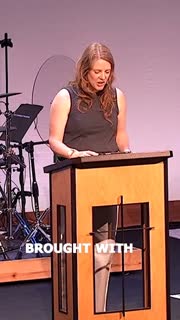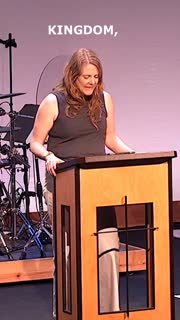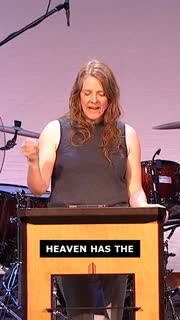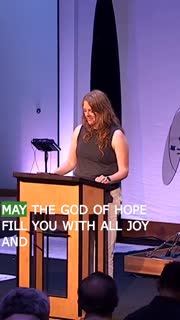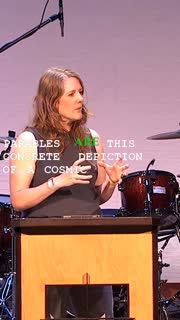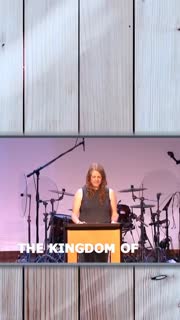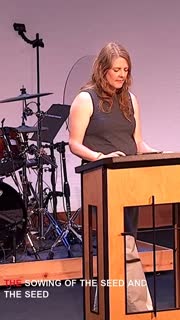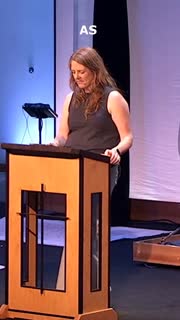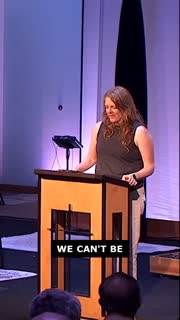Living as Kingdom People Amidst Good and Evil
Devotional
Sermon Summary
Bible Study Guide
Sermon Clips
### Quotes for Outreach
1. "The kingdom that Jesus brought with him into our world, the one that we now live in and live among, is so totally different than any human kingdom that the disciples and everyone since and everyone beyond us have known that we just have trouble wrapping our minds around it." [36:32] (17 seconds)
2. "God's kingdom is all powerful, will prevail against any evil, is eternal, but the way in which God rules his kingdom and the means by which he exercises his power is with limitless grace. This is just so foreign to us, so unfathomable that this would be powerful." [37:12] (20 seconds)
3. "As people of the kingdom, we are people who honestly believe in a God that brings good change. Being a person of the kingdom doesn't mean that the change is easy or that it doesn't come without anxiety, doubts, unknowns, uncertainty, worries. But whatever the journey is that gets us there, we, in our hearts, hold in our hearts the kingdom of heaven can bring about change in systems, in institutions, in people." [46:32] (28 seconds)
4. "The kingdom of heaven has the power to turn a weed into wheat. That's what the kingdom is like. That's pretty powerful." [47:04] (8 seconds)
5. "May the God of hope fill you with all joy and peace in believing so that by the power of the Holy Spirit, you may abound in hope. May it be so. Have a really great week. See you next time." [01:06:48] (12 seconds)
### Quotes for Members
1. "Parables are this concrete depiction of a cosmic truth. As Jesus tells parables, he uses familiar imagery to the time, not necessarily always familiar to us still, but he uses this familiar imagery to create metaphors that spark curiosity and deeper reflection." [34:55] (21 seconds)
2. "The kingdom of heaven is like a man who sows. Jesus gives an interpretation to his disciples about who the players are in the metaphor of this parable. So Matthew 13, 37 to 39. The one who sowed the good seed is the son of man. The field is the world, and the good seed stands for the people of the kingdom. The weeds are the people of the evil one, and the enemy who sows them is the devil. The harvest is the end of the age, and the harvesters are angels." [40:11] (32 seconds)
3. "The sowing of the seed and the seed tending that we do takes place in this time of waiting. So the kingdom of heaven waits. In the parable, the sower says not to pull up the weeds immediately because if so, the weed could be damaged at the same time. So just as the farmer, even now, doesn't plant a field and then immediately harvest it that same day, the same is true here, that the seeds and the weeds have a chance to grow." [43:16] (28 seconds)
4. "As we look at what the kingdom of heaven is like, we see and understand only in part and need Jesus as the full revelation. We get to come to the table today in communion, and we're offered in communion a reminder of us needing Jesus in the full revelation. We can come with humility, recognizing that he's the sower of the good seed, that we're in a time of waiting, and that we want to be active and see the kingdom of heaven revealed as we wait for Jesus to be the ultimate judge." [54:21] (34 seconds)
5. "We can't be tolerant of evil, but the destruction of evil is not our task. We must stop being evil ourselves and we must stop evil from destroying. But how can we stop evil without becoming evil in the process? How do we trim the bush without killing it? It's one of the questions that we wrestle with as we head into the week and there's no tidy answer. But let's start with the question. Life is long and we're on this journey together." [01:06:48] (28 seconds)
Ask a question about this sermon
1. "The kingdom that Jesus brought with him into our world, the one that we now live in and live among, is so totally different than any human kingdom that the disciples and everyone since and everyone beyond us have known that we just have trouble wrapping our minds around it." [36:32] (17 seconds)
2. "God's kingdom is all powerful, will prevail against any evil, is eternal, but the way in which God rules his kingdom and the means by which he exercises his power is with limitless grace. This is just so foreign to us, so unfathomable that this would be powerful." [37:12] (20 seconds)
3. "As people of the kingdom, we are people who honestly believe in a God that brings good change. Being a person of the kingdom doesn't mean that the change is easy or that it doesn't come without anxiety, doubts, unknowns, uncertainty, worries. But whatever the journey is that gets us there, we, in our hearts, hold in our hearts the kingdom of heaven can bring about change in systems, in institutions, in people." [46:32] (28 seconds)
4. "The kingdom of heaven has the power to turn a weed into wheat. That's what the kingdom is like. That's pretty powerful." [47:04] (8 seconds)
5. "May the God of hope fill you with all joy and peace in believing so that by the power of the Holy Spirit, you may abound in hope. May it be so. Have a really great week. See you next time." [01:06:48] (12 seconds)
### Quotes for Members
1. "Parables are this concrete depiction of a cosmic truth. As Jesus tells parables, he uses familiar imagery to the time, not necessarily always familiar to us still, but he uses this familiar imagery to create metaphors that spark curiosity and deeper reflection." [34:55] (21 seconds)
2. "The kingdom of heaven is like a man who sows. Jesus gives an interpretation to his disciples about who the players are in the metaphor of this parable. So Matthew 13, 37 to 39. The one who sowed the good seed is the son of man. The field is the world, and the good seed stands for the people of the kingdom. The weeds are the people of the evil one, and the enemy who sows them is the devil. The harvest is the end of the age, and the harvesters are angels." [40:11] (32 seconds)
3. "The sowing of the seed and the seed tending that we do takes place in this time of waiting. So the kingdom of heaven waits. In the parable, the sower says not to pull up the weeds immediately because if so, the weed could be damaged at the same time. So just as the farmer, even now, doesn't plant a field and then immediately harvest it that same day, the same is true here, that the seeds and the weeds have a chance to grow." [43:16] (28 seconds)
4. "As we look at what the kingdom of heaven is like, we see and understand only in part and need Jesus as the full revelation. We get to come to the table today in communion, and we're offered in communion a reminder of us needing Jesus in the full revelation. We can come with humility, recognizing that he's the sower of the good seed, that we're in a time of waiting, and that we want to be active and see the kingdom of heaven revealed as we wait for Jesus to be the ultimate judge." [54:21] (34 seconds)
5. "We can't be tolerant of evil, but the destruction of evil is not our task. We must stop being evil ourselves and we must stop evil from destroying. But how can we stop evil without becoming evil in the process? How do we trim the bush without killing it? It's one of the questions that we wrestle with as we head into the week and there's no tidy answer. But let's start with the question. Life is long and we're on this journey together." [01:06:48] (28 seconds)
